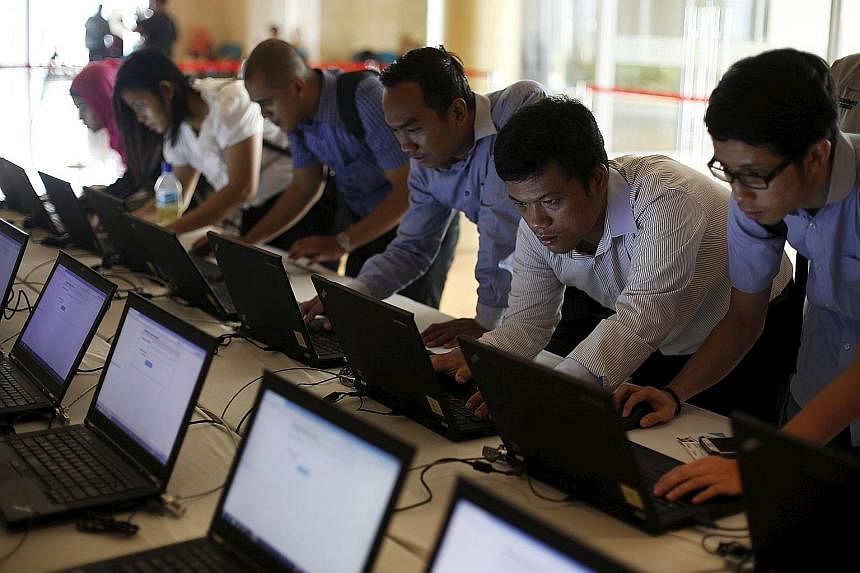JAKARTA - Indonesian companies are shedding jobs as they grapple with the weakest economic growth in six years, adding to the troubles facing President Joko Widodo, who was elected last year on pledges to dig the country out of a rut.
Government data might suggest no cause for alarm. Unemployment was 5.81 per cent in February, up slightly from 5.7 per cent a year earlier, but official numbers are notoriously unreliable and do not adequately cover the informal sector, which makes up two-thirds of South-east Asia's biggest economy.
Recent reports of layoffs across the country paint a bleaker picture, and business executives, recruitment firms and job seekers say it is getting worse.
-
Indonesia's weakening economy
-
GDP: Gross domestic product growth fell to 4.7 per cent in the first quarter of this year, the lowest since 2009.
TRADE: Trade surplus widened last month for the sixth straight month, to US$950 million (S$1.3 billion). Imports plunged by 21.4 per cent from last year, while exports fell 15.2 per cent year on year.
MANUFACTURING: Manufacturing activity contracted for the eighth straight month last month, with output, new orders and employment all weak, an HSBC Markit survey showed.
INFLATION: Last month's annual headline inflation rate increased to 7.15 per cent, the highest this year.
SOURCE: REUTERS, BLOOMBERG
Young people are being hit hardest. The International Labour Organisation estimated the youth jobless rate was more than 20 per cent in 2013, and economists believe it is higher now.
About a third of the workforce is aged between 15 and 29, a youth bulge that could bring Indonesia, a country of 250 million people, the sort of demographic dividend China and South Korea enjoyed a generation ago, but only if there are jobs for the two million people joining the workforce every year.
"The government doesn't have a blueprint for labour absorption," said Mr Hariyadi Sukamdani, chairman of the Indonesian employers' association.
"If this condition is allowed to continue, what we would get is not a demographic bonus, but a demographic disaster. There could be social turmoil and higher crime rates."
When he took office eight months ago, Mr Joko said he would pour billions of dollars into infrastructure and foster growth in manufacturing.
But the promised splurge on roads, power plants and ports has not materialised, largely because of bureaucratic hold-ups and land disputes, and a shortage of skilled labour is holding back growth in value-added industries.
Miners have been hammered by a double whammy - a ban on mineral ore exports and a sharp drop in commodity prices.
Meanwhile, labour-intensive industries such as textiles and manufacturing have been hit by the rupiah's slide to a 17-year low.
Hundreds of redundant garment factory workers protestedlast week in the financial district of Jakarta after their company was declared bankrupt and its assets seized by two banks.
Unemployment in turn is hitting consumption, which makes up more than half of Indonesia's economy. Car sales last month fell 18.4 per cent from a year earlier, the ninth decline in a row.
"Stocks are piling up because nobody is buying. The people's purchasing power is weak," said Mr Ade Sudrajat, head of Indonesia's textile association. "This has never happened before in the last 45 years."
Mr Arif Budimanta, adviser to Finance Minister Bambang Brodjonegoro, said the government was introducing measures such as halving lending rates for small businesses and exempting most goods from a luxury tax to stimulate consumption.
But the gloom at job fairs in Jakarta is palpable. Ms Naomi Octiva Naibaho, a manager at the Kompaskarier.com portal that ran one such fair recently, said about 6,000 job seekers turned up every day, roughly triple the number of positions on offer.
Ms Gita Harahap, 26, has been sending resumes for weeks since the bank where she worked as a teller started layoffs.
"No one has called me back. The competition is tighter," she said.
REUTERS

